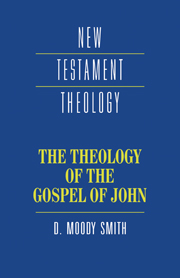Book contents
- Frontmatter
- Contents
- Dedication
- Editor's preface
- Preface
- List of abbreviations
- 1 Introduction
- 2 The setting and sources of Johannine theology
- 3 The themes of Johannine theology
- 4 The theology of John and the issues it raises
- List of further reading
- Index of references
- Index of modern authors
- Index of subjects
2 - The setting and sources of Johannine theology
Published online by Cambridge University Press: 17 December 2010
- Frontmatter
- Contents
- Dedication
- Editor's preface
- Preface
- List of abbreviations
- 1 Introduction
- 2 The setting and sources of Johannine theology
- 3 The themes of Johannine theology
- 4 The theology of John and the issues it raises
- List of further reading
- Index of references
- Index of modern authors
- Index of subjects
Summary
THE GENERAL RELIGIOUS SETTING
If the question of authorship was the crucial problem and issue for late nineteenth-century and early twentieth-century scholarship, the question of the background or setting and sources of the Gospel came to dominate twentieth-century research and the determination of the nature and character of Johannine theology. At issue is the question of the Johannine world. From what world of Hellenism, Judaism, or early Christianity does the Fourth Gospel stem? Quite obviously these are not mutually exclusive possibilities, for it is clear that whatever else its background, the Gospel of John stems from some early Christian environment. Moreover, recent scholarship has shown us that Judaism itself existed within the cultural and conceptual world of Hellenism, distinctive though it may have been.
Hellenism
Within the broader Mediterranean world, John was once thought to have originated among Greeks or pagans, that is, among Christians who had not previously been Jews. Such a view arose in recognition of the fact that the Gospel of John, and even the Jesus of that Gospel, speaks a language different from the Synoptic Gospels and the Synoptic Jesus. His vocabulary and style, as well as his phrasing, are more like those of I John than those of the Synoptic Jesus. The very beginning of the Fourth Gospel, the prologue (1:1–18), appears philosophical or even metaphysical in its aim or interests.
- Type
- Chapter
- Information
- The Theology of the Gospel of John , pp. 10 - 74Publisher: Cambridge University PressPrint publication year: 1995



